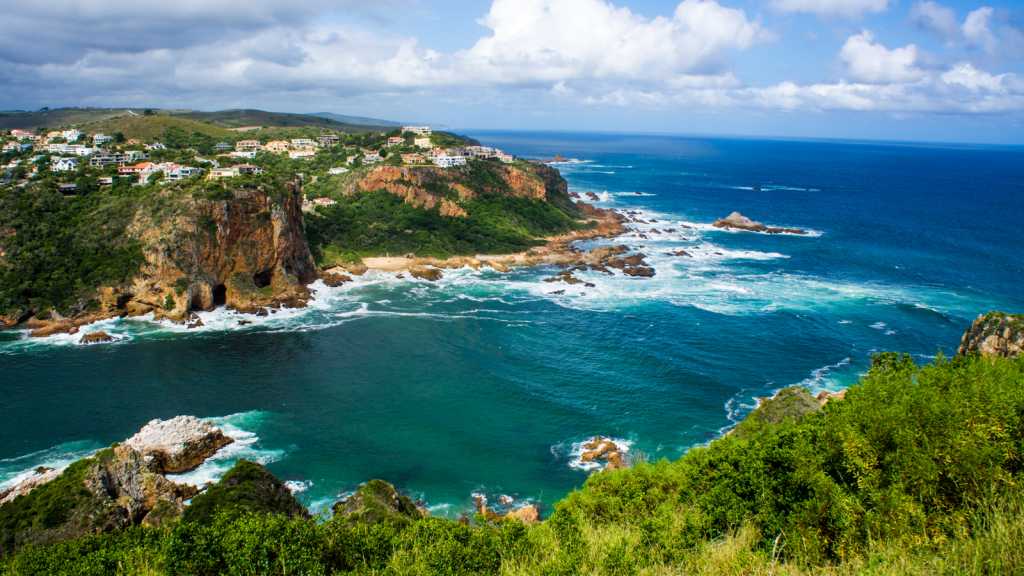The charming town of Knysna:
Dominated by the "Heads", two limestone cliffs that command access to the ocean, its beautiful navigable lagoon is protected by the National Parks Board. Many artists and artisans live there, taking advantage of the access to the forests where the rare precious woods of the country (Knysna Forest) still grow. Official capital of the oyster, Knysna organizes the Oyster Festival every year in July (10 days).
Activities suggestions:
- the Knysna Elephant Park
- excursion in the Featherbed Nature Reserve
- cruise on the Knysna lagoon
- the Knysna Oyster Festival
Between Cape Town (Western Cape) and Port Elizabeth (Eastern Cape), the Garden Route connects Mossel Bay to Storms River along the coastline bordered by the Indian Ocean.
This route is one of the most beautiful coastal strips in the world where alternate beaches and bays, mountains and lagoons, thick forest, lush vegetation...
Its main localities are: George built at the foot of the Outeniqua Mountains, Mossel Bay discovered by Bartolomeu Dias in 1488, the World Heritage listed Goukamma Nature Reserve, Knysna known for its oysters and its lagoon, Plettenberg Bay with long white beaches, and Tsitsikamma National Park.
Advice:
- Allow a minimum of 3 nights to fully enjoy the Garden Route.
- Combine Route 62 with the Garden Route: it offers a more scenic alternative to the N2 highway between Cape Town and George, passing through Worcester, Montagu, Oudtshoorn (then you join the Garden Route to George).
South Africa, the 'rainbow' nation.
South Africa is so diverse you feel like you are visiting several countries in one trip!
With grandiose and various landscapes (mountains, « bush », beaches, forests, plains, desert), a pleasant climate in all seasons, an abundant and diversified fauna and flora including the “Big Five”, a population with the most composite ethnic groups, South Africa accumulates important natural wealth. Also note among its assets: quality of the hotel sector, services, road network, means of transport, rich and varied gastronomy, excellent wines, favourable exchange rates, 21 national parks and many private reserves, a multitude of activity throughout the country…
When to go?
South Africa has this peculiarity of presenting a wide variety of climates: Mediterranean, subtropical or temperate depending on the region with a high rate of sunshine everywhere (watch out for sunburn!)
South Africa can be visited all year round with more favourable periods depending on interests:
-
June, July and August (South African winter) for animals and therefore preferably the North of the country.
-
September and October: best times for flowers (Namaqualand) but very good for game drives as well.
-
From November to March (South African summer): best time to enjoy the South and East of the country, beaches of the Cape and the Indian Ocean. The Garden Route is particularly appreciated in February: the weather is nice; the temperature of the water is pleasant.
-
April and May: very pleasant autumn with always nice days in Cape Town and the resumption of the animal season.
Formalities:
The passport must include two blank pages and still be valid for 30 days after the expected date of exit from South Africa.
French nationals are exempted from prior visas. A 90-day residence permit will be issued at the border on entry into South African territory.
For other nationalities, inquire on a case-by-case basis with the competent authorities of their country of origin.
For any minor child: a multilingual extract of birth certificate (or an unabridged birth certificate translated into English - certified translation) is required to enter and leave South Africa (in the case of a child traveling with his 2 parents). Please consult the official sites for more information about all the requested documents according to your case.
Health:
No vaccinations are required for entry into South Africa. However, it is advisable to check the updating of your usual reminders and vaccinations as for any country.
Anti-malarial treatment is recommended (see your doctor).
Currency:
The Rand is the official currency of South Africa (symbol: ZAR). Credit cards are accepted everywhere and distributors are easily available for cash withdrawal. Travellers’ checks in euros are also accepted in banks and some hotels.
